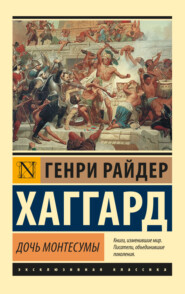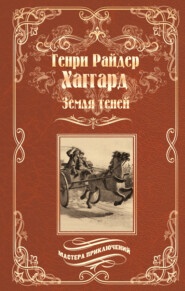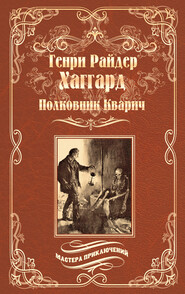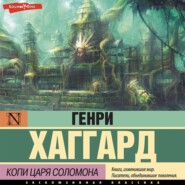По всем вопросам обращайтесь на: info@litportal.ru
(©) 2003-2024.
✖
Dr. Therne
Настройки чтения
Размер шрифта
Высота строк
Поля
Next to this merchant stood the two priests. Of the first of these the brigands asked a question, to which, with some hesitation, the priest – that man who had shown so much terror – replied in the affirmative, whereon his companion looked at him contemptuously and muttered a Spanish phrase which means “Man without shame.” Of him also the same question was asked, in answer to which he shook his head, whereon he was conducted, though without violence or being searched, to the coach, and shut into it with the plundered merchant. Then the thieves went to work with the next victim.
“Dr. Therne,” whispered Emma Becker, “you have a pistol, do you not?”
I nodded my head.
“Will you lend it me? You understand?”
“Yes,” I answered, “I understand, but I hope that things are not so bad as that.”
“They are,” she answered with a quiver in her voice. “I have heard about these Mexican brigands. With the exception of that priest and myself they will put all of you into the coach and push it over the precipice.”
At her words my heart stood still and a palpable mist gathered before my eyes. When it cleared away my brain seemed to awake to an abnormal activity, as though the knowledge that unless it was used to good effect now it would never be used again were spurring it to action. Rapidly I reviewed the situation and considered every possible method of escape. At first I could think of none; then suddenly I remembered that the driver and his companion, who no doubt knew every inch of the road, had leaped from the coach, apparently over the edge of the precipice. This I felt sure they would not have done had they been going to certain death, since they would have preferred to take their chance of mercy at the hands of the brigands. Moreover, these gentry themselves had driven the mules into the abyss whither those wise animals would never have gone unless there was some foothold for them.
I looked behind me but could discover nothing, for, as is common in Mexico at the hour of dawn, the gulf was absolutely filled with dense vapours. Then I made up my mind that I would risk it and began to shuffle slowly backwards. Already I was near the edge when I remembered Emma Becker and paused to reflect. If I took her with me it would considerably lessen my chances of escape, and at any rate her life was not threatened. But I had not given her the pistol, and at that moment even in my panic there rose before me a vision of her face as I had seen it in the lamplight when she looked up at the glory shining on the crest of Orizaba.
Had it not been for this vision I think it possible that I might have left her. I wish to gloze over nothing; I did not make my own nature, and in these pages I describe it as it was and is without palliation or excuse. I know that this is not the fashion in autobiographies; no one has done it since the time of Pepys, who did not write for publication, and for that very reason my record has its value. I am physically and, perhaps morally also, timid – that is, although I have faced it boldly enough upon occasion, as the reader will learn in the course of my history, I fear the thought of death, and especially of cruel and violent death, such as was near to me at that moment. So much did I fear it then that the mere fact that an acquaintance was in danger and distress would scarcely have sufficed to cause me to sacrifice, or at least to greatly complicate, my own chances of escape in order to promote hers simply because that acquaintance was of the other sex. But Emma had touched a new chord in my nature, and I felt, whether I liked it or not, that whatever I could do for myself I must do for her also. So I shuffled forward again.
“Listen,” I whispered, “I have been to look and I do not believe that the cliff is very steep just here. Will you try it with me?”
“Of course,” she answered; “I had as soon die of a broken neck as in any other way.”
“We must watch our chance then, or they will see us run and shoot. Wait till I give you the signal.”
She nodded her head and we waited.
At length, while the fourth and last merchant, who stood next to me, was being dealt with, just as in our despair we were about to throw ourselves into the gulf before them all, fortune gave us our opportunity. This unhappy man, having probably some inkling of the doom which awaited him, broke suddenly from the hands of his captors, and ran at full speed down the road. After him they went pell-mell, every thief of them except one who remained – fortunately for us upon its farther side – on guard by the door of the diligence in which four people, three merchants and a priest, were now imprisoned. With laughs and shouts they hunted their wretched quarry, firing shots as they ran, till at length one of them overtook the man and cut him down with his machete.
“Don’t look, but come,” I whispered to my companion.
In another instant we were at the edge of the cliff, and a foot or so below us was spread the dense, impenetrable blanket of mist. I stopped and hesitated, for the next step might be my last.
“We can’t be worse off, so God help us,” said Emma, and without waiting for me to lead her she swung herself over the edge.
To my intense relief I heard her alight within a few feet, and followed immediately. Now I was at her side, and now we were scrambling and slipping down the precipitous and rocky slope as swiftly as the dense wet fog would let us. I believe that our escape was quite unnoticed. The guard was watching the murder of the merchant, or, if he saw us, he did not venture to leave the carriage door, and the priest who had accepted some offer which was made to him, probably that his life would be spared if he consented to give absolution to the murderers, was kneeling on the ground, his face hidden in his hands.
As we went the mist grew thinner, and we could see that we were travelling down a steep spur of the precipice, which to our left was quite sheer, and that at the foot of it was a wide plain thickly but not densely covered with trees. In ten minutes we were at the bottom, and as we could neither see nor hear any sign of pursuers we paused for an instant to rest.
Not five yards from us the cliff was broken away, and so straight that a cat could not have climbed it.
“We chose our place well,” I said pointing upwards.
“No,” Emma answered, “we did not choose; it was chosen for us.”
As she spoke a muffled and terrifying sound of agony reached us from above, and then, in the layers of vapour that still stretched between us and the sky, we perceived something huge rushing swiftly down. It appeared; it drew near; it struck, and fell to pieces like a shattered glass. We ran to look, and there before us were the fragments of the diligence, and among them the mangled corpses of five of our fellow-travellers.
This was the fate that we had escaped.
* * *
“Oh! for God’s sake come away,” moaned Emma, and sick with horror we turned and ran, or rather reeled, into the shelter of the trees upon the plain.
Chapter 2
The Hacienda
“What are those?” said Emma presently, pointing to some animals that were half hidden by a clump of wild bananas. I looked and saw that they were two of the mules which the brigands had cut loose from the diligence. There could be no mistake about this, for the harness still hung to them.
“Can you ride?” I asked.
She nodded her head. Then we set to work. Having caught the mules without difficulty, I took off their superfluous harness and put her on the back of one of them, mounting the other myself. There was no time to lose, and we both of us knew it. Just as we were starting I heard a voice behind me calling “senor.” Drawing the pistol from my pocket, I swung round to find myself confronted by a Mexican.
“No shoot, senor,” he said in broken English, for this man had served upon an American ship, “Me driver, Antonio. My mate go down there,” and he pointed to the precipice; “he dead, me not hurt. You run from bad men, me run too, for presently they come look. Where you go?”
“To Mexico,” I answered.
“No get Mexico, senor; bad men watch road and kill you with machete so,” and he made a sweep with his knife, adding “they not want you live tell soldiers.”
“Listen,” said Emma. “Do you know the hacienda, Concepcion, by the town of San Jose?”
“Yes, senora, know it well, the hacienda of Senor Gomez; bring you there to-morrow.”
“Then show the way,” I said, and we started towards the hills.
All that day we travelled over mountains as fast as the mules could carry us, Antonio trotting by our side. At sundown, having seen nothing more of the brigands, who, I suppose, took it for granted that we were dead or were too idle to follow us far, we reached an Indian hut, where we contrived to buy some wretched food consisting of black frijole beans and tortilla cakes. That night we slept in a kind of hovel made of open poles with a roof of faggots through which the water dropped on us, for it rained persistently for several hours. To be more accurate, Emma slept, for my nerves were too shattered by the recollection of our adventure with the brigands to allow me to close my eyes.
I could not rid my mind of the vision of that coach, broken like an eggshell, and of those shattered shapes within it that this very morning had been men full of life and plans, but who to-night were – what? Nor was it easy to forget that but for the merest chance I might have been one of their company wherever it was gathered now. To a man with a constitutional objection to every form of violence, and, at any rate in those days, no desire to search out the secrets of Death before his time, the thought was horrible.
Leaving the shelter at dawn I found Antonio and the Indian who owned the hut conversing together in the reeking mist with their serapes thrown across their mouths, which few Mexicans leave uncovered until after the sun is up. Inflammation of the lungs is the disease they dread more than any other, and the thin night air engenders it.
“What is it, Antonio?” I asked. “Are the brigands after us?”
“No, senor, hope brigands not come now. This senor say much sick San Jose.”
I answered that I was very sorry to hear it, but that I meant to go on; indeed, I think that it was only terror of the brigands coupled with the promise of a considerable reward which persuaded him to do so, though, owing to my ignorance of Spanish and his very slight knowledge of English, precisely what he feared I could not discover. In the end we started, and towards evening Antonio pointed out to us the hacienda of Concepcion, a large white building standing on a hill which overshadowed San Jose, a straggling little place, half-town, half-village, with a population of about 3,000 inhabitants.
Just as, riding along the rough cobble-paved road, we reached the entrance to the town, I heard shouts, and, turning, saw two mounted men with rifles in their hands apparently calling to us to come back. Taking it for granted that these were the brigands following us up, although, as I afterwards discovered, they were in fact rurales or cavalry-police, despite the remonstrances of Antonio I urged the jaded mules forward at a gallop. Thereupon the rurales, who had pulled up at a spot marked by a white stone, turned and rode away.
We were now passing down the central street of the town, which I noticed seemed very deserted. As we drew near to the plaza or market square we met a cart drawn by two mules and led by a man who had a serape wrapped about his nose and mouth as though it were still the hour before the dawn. Over the contents of this cart a black cloth was thrown, beneath which were outlined shapes that suggested – but, no, it could not be. Only why did Antonio cross himself and mutter Muerte! or some such word?
Now we were in the plaza. This plaza, where in happier times the band would play, for all Mexicans are musical, and the population of San Jose was wont to traffic in the day and enjoy itself at night, was bordered by an arched colonnade. In its centre stood a basin of water flowing from a stone fountain of quaint and charming design.
“Look at all those people sleeping,” said Emma, as we passed five or six forms that, very small and quiet, lay each under a blanket beneath one of the arches. “Why, there are a lot more just lying down over there. What funny folk to go to bed in public in the afternoon,” and she pointed to a number of men, women and children who seemed to be getting up, throwing themselves down and turning round and round upon mattresses and beds of leaves in the shadow of the arcade which we approached.
Presently we were within three paces of this arcade, and as we rode up an aged hag drew a blanket from one of the prostrate forms, revealing a young woman, over whom she proceeded to pour water that she had drawn from a fountain. One glance was enough for me. The poor creature’s face was shapeless with confluent smallpox, and her body a sight which I will not describe. I, who was a doctor, could not be mistaken, although, as it chanced, I had never seen a case of smallpox before. The truth is that, although I have no fear of any other human ailment, smallpox has always terrified me.
For this I am not to blame. The fear is a part of my nature, instilled into it doubtless by the shock which my mother received before my birth when she learned that her husband had been attacked by this horrible sickness. So great and vivid was my dread that I refused a very good appointment at a smallpox hospital, and, although I had several opportunities of attending these cases, I declined to undertake them, and on this account suffered somewhat in reputation among those who knew the facts. Indeed, my natural abhorrence went even further, as, to this day, it is only with something of an effort that I can bring myself to inspect the vesicles caused by vaccination. Whether this is because of their similarity to those of smallpox, or owing to the natural association which exists between them, I cannot tell. That it is real enough, however, may be judged by the fact that, terrified as I was at smallpox, and convinced as I have always been of the prophylactic power of vaccination, I could never force myself – until an occasion to be told of – to submit to it. In infancy, no doubt, I was vaccinated, for the operation has left a small and very faint cicatrix on my arm, but infantile vaccination, if unrepeated, is but a feeble protection in later life.
Unconsciously I pulled upon the bridle, and the tired mule stopped. “Malignant smallpox!” I muttered, “and that fool is trying to treat it with cold water!”

















